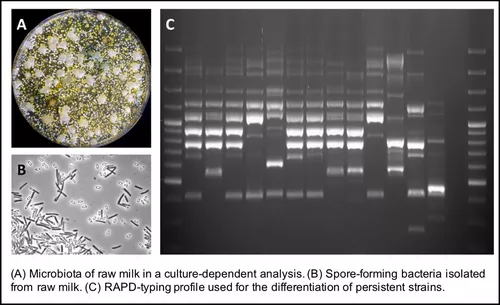Hygiene and microbiota of milk products
Group leader until 2021: Dr. Etienne Doll
This project was performed in close cooperation with Dr. Mareike Wenning, LGL Oberschleißheim (https://www.lgl.bayern.de)
The group’s focus is on the applied research of the hygiene and microbiota of milk and milk products. The value chain of dairy products strongly depends on their hygienic properties. The main determinants of an impeccable microbial quality are the raw milk microbiota on the one hand, and the hygienic design of production processes on the other hand.
In the NextMilQ project, we analyze the raw milk microbiota by high-throughput amplicon sequencing. Apart from a “typical” qualitative and quantitative composition of the microbiota, we aim to analyze different influencing factors like conventional or organic production, geographic position, and herd size. Additionally, methods for the rapid detection of hygienically relevant (spoilage) microorganisms are developed.
The second project’s focus is on the process hygiene in the production of milk and whey powders. Here, counts of thermophilic spores are important indicators and determinants of product quality. To reduce the spore-load of powders we investigate strategies to avoid and reduce the persistence of thermophilic strains in the processing lines. Therefore, persisting strains are detected by RAPD-typing and the inactivation-efficacy of different cleaning regimens is tested experimentally. Additionally, the adaptation of strains on a genetic level is analyzed by comparative genomics.

Publications
Breitenwieser F, Doll EV, Clavel T, Scherer S, Wenning M (2020) Complementary use of cultivation and high-throughput amplicon sequencing reveals high biodiversity within raw milk microbiota. Frontiers in Microbiology 11:1557. Doi 10.3389/fmicb.2020.01557.
Dettling A, Wedel C, Huptas C, Hinrichs J, Scherer S, Wenning M (2020) High counts of thermophilic spore formers in dairy powders originate from persisting strains in processing lines. International Journal of Food Microbiology 335:108888.
Doi 1 0.1016/j.ijfoodmicro.2020.108888.
Wedel C,Konschelle T, Dettling A, Wenning M, Scherer S, Hinrichs J (2019) Thermally induced milk fouling: Survival of thermophilic spore formers and potential of contamination. Intern. Dairy Journal 101:104582. Doi:10.1016/j.idairyj.2019.104582
Dettling A, Doll E, Wedel C,Hinrichs J, Scherer S, Wenning M (2019) Accurate quantification of thermophilic spores in dairy powders. International Dairy Journal 98:64-71. Doi:10.1016/j.idairyj.2019.07.003
Wedel C, Wenning M, Dettling A, Scherer S, Hinrichs J (2019) Resistance of thermophilic spore formers isolated from milk and whey products towards cleaning-in-place conditions: Indluence of pH, temperature and milk residues. Food Microbiology 83:150-158. Doi: 10/1016/j.fm.2019.05.002
Wedel C, Wunsch A, Wenning M, Dettling A, Kayser K-H, Lehner W-D, Hinrichs J (2018) Thermal treatment of skim milk concentrates in a novel shear-heating device: Reduction of thermophilic spores and physical properties. Food Res Int. 2018 May; 107:19-26.
Reich C, Wenning M, Dettling A, Luma KE, Hinrichs J (2017) Thermal resistance of vegetative thermophilic spore forming bacilli in skim milk isolated from dairy environments. Food Control. 2017 Dec; 82:114-120.
Doll EV, Scherer S, Wenning M (2017) Spoilage of microfiltered and pasteurized Extended Shelf Life Milk is mainly induced by psychrotolerant spore-forming bacteria that often originate from recontamination. Front Microbiol. 2017 Jan 31; 8: 135.
von Neubeck M, Baur C, Krewinkel M, Stoeckel M, Kranz B, Stressler T, Fischer L, Hinrichs J, Scherer S, Wenning M (2015) Biodiversity of refrigerated raw milk microbiota and their enzymatic spoilage potential. Int. J Food Microbiol.2015 Oct 15; 211: 57-65.
Wenning M, Scherer S (2013) Identification of microorganisms by FTIR spectroscopy: perspectives and limitations of the method. Appl Microbiol Biotechnol. 2013 Jul 17; 97:7111-712.
Schmidt VSJ, Kaufmann V, Kulozik U, Scherer S, Wenning M (2012) Microbial biodiversity, quality, and shelf life of microfiltered and pasteurized extended shelf life (ESL) milk from Germany, Austria, and Switzerland. Int J Food Microbiol. 2012 Mar; 154:1-9.
Wenning M, Theilmann V, Scherer S. (2006) Rapid analysis of two food-borne microbial communities at the species level by Fourier-transform infrared microspectroscopy. Environ. Microbiol. 2006 Apr 04; 8:848-857.